- Hey Dullblog Online Housekeeping Note - May 6, 2022
- Beatles in the 1970s: Melting and Crying - April 13, 2022
- The Beatles, “Let It Be,” and “Get Back”: “Trying to Deceive”? - October 22, 2021
NANCY CARR * I believe that—probably without being aware of the parallel himself—Paul McCartney has written, in “Queenie Eye,” a version of Thackeray’s prologue to his 1847 novel Vanity Fair. And I think this reveals some interesting things about how McCartney thinks about performing and his relationship with fame.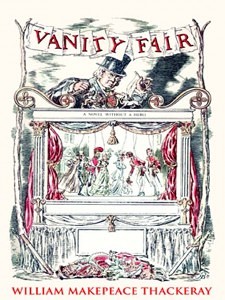
You’ll remember that I’ve called McCartney the Dickens of rock. In general, I’m increasingly convinced that there are strong strains of Victorianism in his sensibility. I don’t mean the Puritanism that often gets associated with the Victorians, God knows, but the exuberant love of spectacle and the (often sentimental) affection for domesticity. On the domestic front, consider that McCartney not only wrote “Eat at Home,” but also penned a love song to his house. His love of spectacle and performance is self-evident, and it’s tempered with a desire to get offstage and shut the door firmly on his private life that is quite Victorian.
McCartney’s simultaneous love of performing and need for distance from the version of himself who performs reminds me of Thackeray’s narrator in Vanity Fair. It’s easily Thackeray’s best novel, in no small part because the narrator is fascinatingly mercurial. He comes in and goes out, is ironic and serious by turns, and generally demonstrates that the Victorians were all over destabilizing narrative conventions long before postmodernism.
Thackeray’s view of Vanity Fair: “Before the Curtain”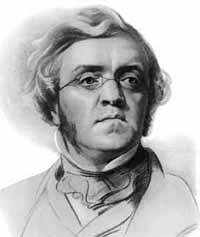
But it’s “Before the Curtain,” the prologue to the novel that is written in Thackeray’s authorial voice, that’s especially pertinent here. To give you the full flavor, I’m including the first three paragraphs (you can read the whole novel for free online here):
Before the Curtain
As the manager of the Performance sits before the curtain on the boards and looks into the Fair, a feeling of profound melancholy comes over him in his survey of the bustling place. There is a great quantity of eating and drinking, making love and jilting, laughing and the contrary, smoking, cheating, fighting, dancing and fiddling; there are bullies pushing about, bucks ogling the women, knaves picking pockets, policemen on the look-out, quacks (OTHER quacks, plague take them!) bawling in front of their booths, and yokels looking up at the tinselled dancers and poor old rouged tumblers, while the light-fingered folk are operating upon their pockets behind. Yes, this is VANITY FAIR; not a moral place certainly; nor a merry one, though very noisy. Look at the faces of the actors and buffoons when they come off from their business; and Tom Fool washing the paint off his cheeks before he sits down to dinner with his wife and the little Jack Puddings behind the canvas. The curtain will be up presently, and he will be turning over head and heels, and crying, “How are you?”
A man with a reflective turn of mind, walking through an exhibition of this sort, will not be oppressed, I take it, by his own or other people’s hilarity. An episode of humour or kindness touches and amuses him here and there–a pretty child looking at a gingerbread stall; a pretty girl blushing whilst her lover talks to her and chooses her fairing; poor Tom Fool, yonder behind the waggon, mumbling his bone with the honest family which lives by his tumbling; but the general impression is one more melancholy than mirthful. When you come home you sit down in a sober, contemplative, not uncharitable frame of mind, and apply yourself to your books or your business.
I have no other moral than this to tag to the present story of “VanityFair.” Some people consider Fairs immoral altogether, and eschew such,with their servants and families: very likely they are right. But persons who think otherwise, and are of a lazy, or a benevolent, or a sarcastic mood, may perhaps like to step in for half an hour, and look at the performances. There are scenes of all sorts; some dreadful combats, some grand and lofty horse-riding, some scenes of high life,and some of very middling indeed; some love-making for the sentimental,and some light comic business; the whole accompanied by appropriate scenery and brilliantly illuminated with the Author’s own candles.
LONDON, June 28, 1848
“Queenie Eye” as McCartney’s portrait of Vanity Fair
Now compare Thackeray’s sharp-eyed description of Vanity Fair and its denizens to McCartney’s lyrics for “Queenie Eye” (I of course recommend listening to the song to get the full effect. Also, I transcribed the lyrics, and take full responsibility for any errors in them.)
“Queenie Eye”
<opens with string music that sounds to me at least like a before-the-curtain overture>
There were rules you never told me
Never came up with a plan
All the stories that you sold me
Didn’t help me understand
But I had to get it worked out
Had nobody who could help
So that in the end it turned out
That I had to do it by myself.
Life’s a game — rags from riches
Dogs and bitches hunt for fame
Difficult to know which way to turn
Lay the blame — on the snitches
Wicked witches fan the flame
Careful what you touch in case you burn
Chorus:
Queenie eye, queenie eye, who’s got the ball?
I haven’t got it, it isn’t in my pocket
O-U-T spells out — that’s out,
Without a shadow of a doubt
‘Cause you been putting it about.
Hear the people shout!
Hear the people shout!
Play the game — take your chances.
Every dance is much the same
Doesn’t matter which of them you choose.
Never blame — circumstances
If romances seldom came
Never pick a fight you’re gonna lose.
<repeat chorus>
<Shift into a quiet, slow-paced segment>
It’s a long way
To the finish
When you’ve never been before.
I was nervous — but I did it.
Now I’m going back for more.
<And . . .then back to the Fair, with plenty of call-and response shouting. I swear that sometimes “It isn’t in my pocket” sounds like “But is it in my pocket?” which would add another dimension of prestidigitation to the song.>
I put it to you that the scene McCartney is painting in “Queenie Eye” is a version of Vanity Fair, with its fame-seekers, hangers-on, and revelers. It’s exciting, with dances, games, and plenty of action, but also full of duplicity (the “snitches”), pain (getting burned), and heartbreak (“romances seldom came”). The music, with its glam-rock stomp and nursery-rhyme chorus, underscores this: the chorus, in particular, sounds like a carnival barker’s come-on.
McCartney in and out of the Fair
The music also emphasizes that the Fair is a place you can choose to visit, and to leave: the slower-paced, quieter part of the song corresponds to the observer’s going home with a “reflective turn of mind” in Thackeray’s prologue. It’s the decision point of the song: now that the speaker has seen the melee and gotten out, should he return? McCartney being the born performer that he is, of course the answer is “yes.”
I recognize that explicating this song in this way leaves me open to accusations of taking the song (and McCartney) too seriously, but I think critics too often blow past his songs without listening to them closely enough. Underneath their surface polish, some of his songs hold meanings well worth mining. (I also acknowledge that some of his songs don’t have anything much underneath the surface polish.)
When I listen to “Queenie Eye” I hear McCartney considering his role as a public performer, and continuing to embrace the rough-and-tumble of being in the limelight despite its cost. I also hear him reminding us (and himself) that it is a performance: after the people stop shouting, there’s nothing for it but to go home, as he suggests in “Alligator”:
I want someone to come home to
I want somewhere I can sleep
I need a place where I can rest my weary bones
and have a conversation not too deep.
Predictably, that last line has led some reviewers to quip that McCartney never wants to be “too deep,” and to a point that’s legitimate. But at the least, in both this song and “Queenie Eye,” he demonstrates an understanding of himself and his choices that he isn’t usually credited with.



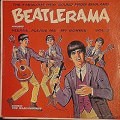


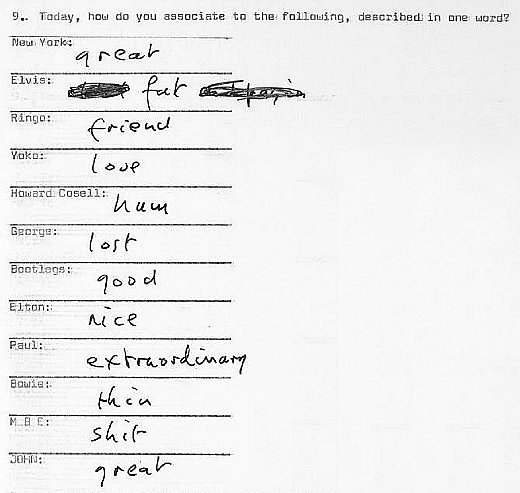
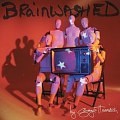
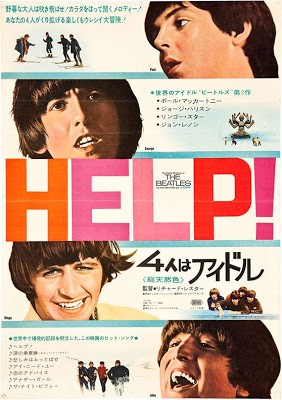
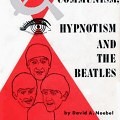
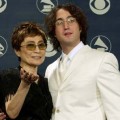
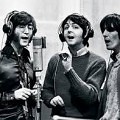
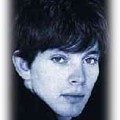
Um, Eat at Home is a song about sex. Specifically it’s a song about having great oral sex with your spouse. Of course, when most rockers write about sordid sex with groupes, only Paul McCartney would write a song about having great sex with your wife. 🙂
Anyway it just didn’t seem to have quite the same innocent meaning of domesticity as you’ve characterized here.
Now off to reread this carefully. I loved the McCartney/Dickens piece you wrote and I think I’m going to enjoy this one, too.
Good point, Drew — but I didn’t mean to imply that McCartney’s version of domesticity is so innocent. Consider “Heart of the Country,” where “the holy people grow”: “smell the grass in the meadow,” eh?
And in “I Love This House” he actually sounds fairly truculent at some points, like he won’t be leaving this house until they carry him out feet first.
So I’d say there’s plenty of room in McCartney’s domestic menage for sex, drugs, and defiance.
I think your analogy is right on the market. Except in Queenie Eye, the “fair” is fame. I think the song is writing about the fame game — going out there, showing off your stuff, taking all the hits from people out to tear you down, making it to the finish in tact, and then deciding down the road to do the whole thing again. Yes it’s much like going back to the fair yet in his case I think the song, and the Queenie Eye game, is a metaphor for celebrity.
I wish people didn’t feel they had to apologize for taking McCartney’s lyrics seriously. Dylan has written his share of bland songs and plagiarized his share of lyrics and yet people still manage to take him seriously. So what that Paul sometimes likes to be silly. There’s a place in life and music for that. Paul’s weird, wacky songs are some of his best. His mistake is when he tried to get preachy and politically meaningful (Freedom, Everybody Out There) that he stumbles. But when he writes about life and love, his lyrics can be as moving and meaningful as Lennon, Dylan, Cohen, Simon, etc., etc.
By the way, you’ve focused on two of the best songs on Paul’s New album — both with excellent lyrics and music. Alligator is especially good and personal. And fuck that writer who of course uses the “conversation not too deep” to demean Paul. The song is Paul looking for someone who can take all of his flaws and moodiness and pull him out of it and love him despite it. It’s pretty damn confessional:
I want someone who can bail me
When I get up to my tricks
I need somebody used to dealing with a sinner
Whenever I get in I fix.
Interesting that he uses the old line, ‘O-U-T spells out’ that the Beatles used in one of their Christmas fan club songs. It comes from an English children’s rhyme for choosing who’s ‘it’ in a game of hide and seek.
This is some first-class lit-crit, Nancy, especially since it has the effect good criticism should always have, which is to make its subject(s) more interesting, not less. I especially like “McCartney’s simultaneous love of performing and need for distance from the version of himself who performs.”
Thanks, Devin — that means a lot coming from you.
I’m convinced many of McCartney’s songs are far more self-revelatory than they are usually considered to be, and one of the things they reveal most clearly is his desire not to disclose too much.